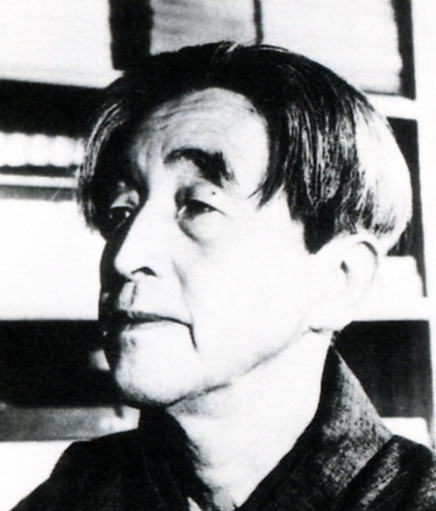- Jun Ishikawa (author)
Infobox Writer
name = Jun Ishikawa

caption = Ishikawa Jun
birthdate = (7 March 1899
birthplace =Tokyo ,Japan
deathdate = death date|1987|12|29|df=y
deathplace =Tokyo ,Japan
occupation = Writer, translator and literary critic
genre = novels, short stories, poetry, essays
movement =Buraiha
notableworks = " Song of Mars "
influences =André Gide ,Anatole France ,Molière
influenced =Abe Kobo
footnotes = nihongo|Jun Ishikawa|石川淳|Ishikawa Jun|7 March 1899 -29 December 1987 was thepen-name of a modernistauthor , translator andliterary critic active inShowa period Japan . His real name (written in the same "kanji ") was Ishikawa Kiyoshi.Early life
Ishikawa was born in the
Asakusa district ofTokyo as the son of a banker. He graduated from the Tokyo School of Foreign Languages (nihongo2|東京外国語学校, laterTokyo University of Foreign Studies ) with a degree inFrench literature . After graduation, he served a tour of duty in theImperial Japanese Navy from 1922-1923, following which he was hired byFukuoka University as a professor ofFrench literature . His early career involved translating works such asAnatole France ’s "Les lilies rouges" andNobel Prize -winning authorAndré Gide ’s "L'Immoraliste" into Japanese.The next year, he was resigned from the university due to controversy over his participation in student protest movements. He returned to Tokyo and began a bohemian existence, living out of cheap pensions while translating Andre Gide's "Les Caves du Vatican" and
Molière 's "Le Misanthrope" and "Tartuffe".Literary career
His literary career began in 1935, when he began writing a series of short stories, starting with "Kajin" (Lady), and "Hinkyu mondo" (Dialog on Poverty) in which he depicted the struggles of a solitary writer attempting to create a
Parnassian fiction. In 1936 he won the fourth annualAkutagawa Prize for his story "Fugen" (The Bodhisattva).In early 1938, when Japan's war against China was at its height, Ishikawa published the brilliantly ironic "Marusu no uta" (Song of Mars), an antiwar story soon banned for fomenting antimilitary thought [http://www.counterpunch.org/jun04122003.html] .
His first novel, "Hakubyo" (Plain Sketch, 1940) was a criticism of
Stalinism . During the war years, he turned his attention to non-fiction, producing biographies onMori Ōgai andWatanabe Kazan . However, his main interest was in the comic verses of theTemmei era of theEdo period ("Kyoka"), of which he became a master. He wrote poetry using thepen-name of nihongo|Isai|夷斎.Along with the likes of Osamu Dazai,
Sakaguchi Ango , andOda Sakunosuke , Ishikawa was known as a member of the "Buraiha " (literally "Ruffian") tradition of anti-conventional literature. In the post-war period, he wrote "Ogon Densetsu" (Legend of Gold, 1946) and "Yakeato no Iesu" (Jesus in the Ashes, 1946). The authorAbe Kobo became his pupil.He also continued his work in essays, which took two forms. In "Isai hitsudan" (Isai’s Discourses, 1950-1951), he covered a wide range of topics in art, literature and current events, in an irreverent, and at times, bitter, style. On the other hand, "Shokoku Kijinden" (Eccentrics and Gallants from around the country, 1955-1957), is a series of biographical sketches of unusual persons from various points in Japanese history.
He turned also to ancient
Japanese history , with the serial publication of "Shinshaku Kojiki" (Another Translation of the "Kojiki"), "Hachiman Engi" (Origins of Gods of Hachiman, 1957) and "Shura" (Demons, 1958), in which he explored the origin of Japanese nation and conflict between the Jōmon and Yayoi peoples.In 1964 he went to a journey to the
Soviet Union andwestern Europe together with Abe Kobo. It was his first overseas travel, and resulted in "Seiyu Nitiroku" (A Record of a Journey West, 1965).In 1967 he joined
Kawabata Yasunari ,Mishima Yukio andAbe Kobo in issuing a statement for protesting the destruction ofChinese art during the ChineseCultural Revolution .Ishikawa was immensely popular in the post-war era, and won numerous awards. His "Edo Bungaku Shoki" (A Brief Survey of Edo Literature, 1980), won the Yomiuri Literary Award.
He died of
lung cancer while working on his last novel, "Hebi no Uta" (A Song of Snakes, 1988),In English
* Ishikawa, Jun. "The Legend of Gold and Other Stories. " Trans. William J. Tyler. Honolulu: University of Hawai'i Press, 1988. ISBN 0824820703
* Ishikawa, Jun. "The Bodhisattva". Columbia University Press (1990). Trans. William J. Tyler. ISBN 0231069626ee also
*
Japanese literature
*List of Japanese authors External links
* [http://www.counterpunch.org/cipris04122003.html http://www.counterpunch.org/cipris04122003.html]
Wikimedia Foundation. 2010.
